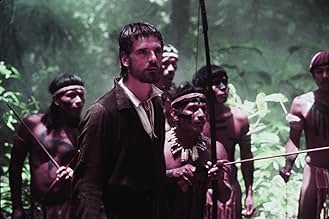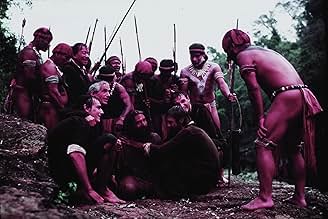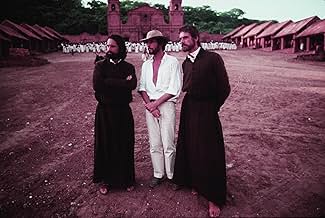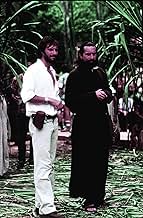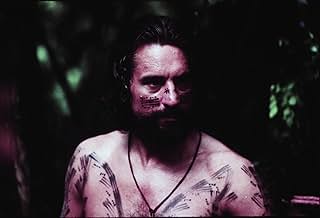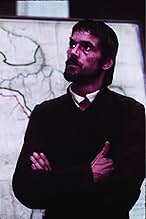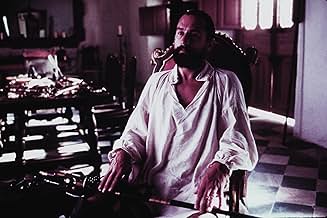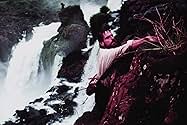Eighteenth-century Spanish Jesuits try to protect a remote South American tribe in danger of falling under the rule of pro-slavery Portugal.Eighteenth-century Spanish Jesuits try to protect a remote South American tribe in danger of falling under the rule of pro-slavery Portugal.Eighteenth-century Spanish Jesuits try to protect a remote South American tribe in danger of falling under the rule of pro-slavery Portugal.
- Won 1 Oscar
- 15 wins & 27 nominations total
- Director
- Writer
- All cast & crew
- Production, box office & more at IMDbPro
Featured reviews
After hearing a quick clip from the soundtrack recently I decided to have another look at 'The Mission' which I hadn't seen for more than ten years. Interesting viewing in these days when epics abound: Lord of the Rings, Gladiator, Troy etc.
The first thing that struck me was the intelligence of the script which often seems an afterthought in today's big budget jobs. Robert Bolt weaves an intriguing web of characters; mercenary, slavetrader, starcrossed lover, papal emissary and man of faith. The passion of Robert de Niro's Mendoza beautifully contrasts the quiet firm conviction of Jeremy Irons' Gabriel. And the moral dilemma facing the Catholic Church, whether to abandon influence abroad for the sake of power at home, is ably brought to life in the tortured mind of Ray McAnally's Altamirano. This man sent from Rome by the Pope himself has the power of life and death over the Guarani Indians and the Jesuit priests who have dedicated their lives to Christian service in the deepest regions of the South American rainforest.
The film isn't perfect by any means: I would have liked better representation of at least one Guarani character but the integrity of Joffe's direction and Chris Menges' spectacular camera-work make this one film you have to see. And there's that lovely soundtrack by Ennio Morricone.
We may be more sophisticated these days in terms of technology, sound engineering and special effects but the lesson from 'The Mission' for today's directors has to be: it's the story, stupid.
The first thing that struck me was the intelligence of the script which often seems an afterthought in today's big budget jobs. Robert Bolt weaves an intriguing web of characters; mercenary, slavetrader, starcrossed lover, papal emissary and man of faith. The passion of Robert de Niro's Mendoza beautifully contrasts the quiet firm conviction of Jeremy Irons' Gabriel. And the moral dilemma facing the Catholic Church, whether to abandon influence abroad for the sake of power at home, is ably brought to life in the tortured mind of Ray McAnally's Altamirano. This man sent from Rome by the Pope himself has the power of life and death over the Guarani Indians and the Jesuit priests who have dedicated their lives to Christian service in the deepest regions of the South American rainforest.
The film isn't perfect by any means: I would have liked better representation of at least one Guarani character but the integrity of Joffe's direction and Chris Menges' spectacular camera-work make this one film you have to see. And there's that lovely soundtrack by Ennio Morricone.
We may be more sophisticated these days in terms of technology, sound engineering and special effects but the lesson from 'The Mission' for today's directors has to be: it's the story, stupid.
The Mission is amoung the top ten or twenty films ever made. At this point it is my favourite film. It is an eloquent essay in faith and redemption. The two most moving scenes are the one in which the Brother enters the Jungle above the waterfall, from which the Indians have cast the previous Brother that went up to them, and knowing that the Indians are all about him unseen in the jungle with their poison tipped arrows, he sits down in a clearing and plays the hauntingly beautiful "Gabriel's obo" tune on his own obo. The Indian's are mesmirised and emerge and befriend him. The Brother thinks: "If I had an orchestra, I could have subdued the whole continent." The other scene is where the former Slave driver, who repents after killing his brother, whom he loved above all else, goes with the Brothers up to the settlement of the Indians whom he was taking away to slavery on sugar plantations. The former slave driver has been forgiven his sins but he nevertheless feels the need to do a private penance of dragging the battle armour of his previous life with him through the jungle. When the brothers come upon the Indians, the slave driver fully expects them to kill him for his deeds but instead they cut away the bundle of armour he is dragging and welcome him to them. This echoing of divine Love by the Indians enables the former slave driver to believe in his redemption and to be born again at one with God. The mission is a film that you won't forget. See it today. (Watch out for Liam Neeson in it too by the way.)
THE MISSION is a history drama about the expulsion of the Jesuits' missions in South America in the middle of the XVIII century. By what I've learned the plot's background is accurate to history and all we see in this movie truly happened in real life, unfortunately! The search for slavery work was continuous at the time by Portuguese colonists and the Spanish in spite of slavery not being directly allowed by their crown they also used the indigenous slaves. The Spaniards which had been creating Indian reductions since the middle of the XVI century, as a form to convert and control those indigenous people, were followed by the Portuguese, and both built Jesuit reductions in their territories. But after the 1750 treatment the Jesuits would be expulsed because they refused to leave their missions where their lived together with the indians, in peace. And the indians themselves they didn't want to abandon the reductions too because they knew that in the main jungle they would be an easy target to slave traders (known as "bandeirantes" in Portuguese colony).
So it's just the main plot's topic of this movie which then focus on the personal story of father Gabriel (played by Jeremy Irons), a Jesuit missionary, and Rodrigo Mendoza (Robert de Niro) a former slave trader which was converted to the Christian faith (and to the Jesuits) after kill his brother (because of a woman). The movie has good moments, especially in the last hour, and it describes very well the feeling of injustice and desperation those native people felt by the furious anger of the greedy imperialist armies! There're a few scenes, which focus the sad and empty native children' eyes, that worth more than a thousand words!
I enjoyed this movie and the plot's main topic which portrays a sad period of our history (unfortunately empires were always built under massacres and the subjugation of other people, and I know Portuguese empire was no exception!).
So it's just the main plot's topic of this movie which then focus on the personal story of father Gabriel (played by Jeremy Irons), a Jesuit missionary, and Rodrigo Mendoza (Robert de Niro) a former slave trader which was converted to the Christian faith (and to the Jesuits) after kill his brother (because of a woman). The movie has good moments, especially in the last hour, and it describes very well the feeling of injustice and desperation those native people felt by the furious anger of the greedy imperialist armies! There're a few scenes, which focus the sad and empty native children' eyes, that worth more than a thousand words!
I enjoyed this movie and the plot's main topic which portrays a sad period of our history (unfortunately empires were always built under massacres and the subjugation of other people, and I know Portuguese empire was no exception!).
I would have to say that this movie is one of the most "real" and beautiful movies that I have ever seen!! One's own life is drawn upon by watching this film.... It is hard to watch all of this movie without wanting to break down and cry... being as young as I am, I find it difficult to understand some of the things in life that happen, and why so many people and groups are treated without respect and dignity. This film helped me to understand that all god's creatures are unique and special and are EQUAL!!! The music is so strong it makes the movie so much better to watch. I think this movie would be NOTHING without the powerful music that is played throughout it... I am glad that I had the opportunity to see this film in a high level Spanish class because it taught me, about me!! What a wonderful movie!!
This movie changed my life. One day I would like to thank Jeremy Irons!
After seeing his portrayal of Father Gabriel, I decided that I wanted to be like him. I wanted to have his faith, to be capable of loving like he did in the movie.
This film made me become a missionary. I went on to work, as missionary, in Italy, Mexico, Guatemala, Morocco, Malawi, and my home country Portugal.
I don't want to tell the things I did, but I just want to recognize, that a good film can change a life and change so many others.
Great Film. Thank you Jeremy Irons, I still want to be as Father Gabriel, after all this years.
After seeing his portrayal of Father Gabriel, I decided that I wanted to be like him. I wanted to have his faith, to be capable of loving like he did in the movie.
This film made me become a missionary. I went on to work, as missionary, in Italy, Mexico, Guatemala, Morocco, Malawi, and my home country Portugal.
I don't want to tell the things I did, but I just want to recognize, that a good film can change a life and change so many others.
Great Film. Thank you Jeremy Irons, I still want to be as Father Gabriel, after all this years.
Did you know
- TriviaRobert De Niro was one of the few who did not became ill with amoebic dysentery.
- GoofsThe indigenous characters speak Wawnana, a Colombian indigenous language, not Guarani, the indigenous language of Paraguay.
- Crazy creditsAt the film's end, after the final credits, Altamirano gives the audience an ambiguous, almost accusing look, as if he were asking, "Would you or would you not have done this?"
- Alternate versionsIn the Blu-ray version, the Warner Bros. Pictures logo is plastered with the 2003 variant.
- ConnectionsEdited into The Nostalgia Critic: Signs (2012)
- SoundtracksGabriel's Oboe
Composed by Ennio Morricone
Details
- Release date
- Countries of origin
- Languages
- Also known as
- La misión
- Filming locations
- Iguazú National Park, Argentina(on location)
- Production companies
- See more company credits at IMDbPro
Box office
- Budget
- $24,500,000 (estimated)
- Gross US & Canada
- $17,218,023
- Opening weekend US & Canada
- $40,366
- Nov 2, 1986
- Gross worldwide
- $17,504,819
- Runtime
- 2h 5m(125 min)
- Color
- Aspect ratio
- 2.39 : 1
Contribute to this page
Suggest an edit or add missing content


